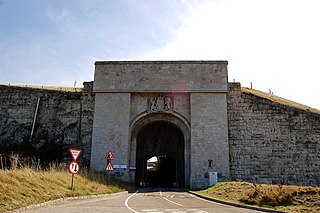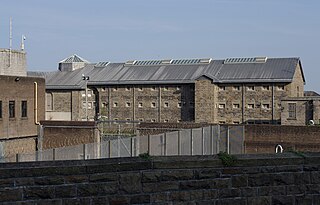Life imprisonment is any sentence of imprisonment for a crime under which convicted people are to remain in prison for the rest of their natural lives or indefinitely until pardoned, paroled, or otherwise commuted to a fixed term. Crimes for which, in some countries, a person could receive this sentence include murder, torture, terrorism, child abuse resulting in death, rape, espionage, treason, drug trafficking, drug possession, human trafficking, severe fraud and financial crimes, aggravated criminal damage, arson, kidnapping, burglary, and robbery, piracy, aircraft hijacking, and genocide, crimes against humanity, war crimes, severe cases of child pornography, or any three felonies in case of three-strikes law. Life imprisonment can also be imposed, in certain countries, for traffic offences causing death. Life imprisonment is not used in all countries; Portugal was the first country to abolish life imprisonment, in 1884.

His Majesty's Prison Service (HMPS) is a part of HM Prison and Probation Service, which is the part of His Majesty's Government charged with managing most of the prisons within England and Wales.

The Probation Service for England and Wales is a statutory criminal justice service, mainly responsible for the supervision of offenders in the community and the provision of reports to the criminal courts to assist them in their sentencing duties. It was established in its current form by the Criminal Justice and Court Services Act in April 2001, but has existed since 1907 as a set of area-based services interacting at arm's length with central government.
In the United Kingdom, the Violent and Sex Offender Register (ViSOR) is a database of records of those required to register with the police under the Sexual Offences Act 2003, those jailed for more than 12 months for violent offences, and those thought to be at risk of offending. In response to a Freedom of Information request in 2009, for example, Greater Manchester Police reported that of 16 people in their area placed on ViSOR since 2007 on their initiative and not as a result of a relevant conviction, four (25%) had clean criminal records.

HM Prison The Verne is a Category C men's prison, located within the historic Verne Citadel, on the Isle of Portland in Dorset, England. Operated by His Majesty's Prison Service, HMP The Verne was established in 1949 and occupies the southern part of the citadel. After a brief spell as an Immigration Removal Centre in 2014–2017, HMP The Verne re-opened in 2018.
In the jurisdiction of England and Wales, a Multi-Agency Public Protection Arrangement (MAPPA) is an arrangement, set up in 2001, for the "responsible authorities" tasked with the management of registered sex offenders, violent and other types of sexual offenders, and offenders who pose a serious risk of harm to the public. The "responsible authorities" of the MAPPA include the National Probation Service, HM Prison Service and England and Wales Police Forces. MAPPA is coordinated and supported nationally by the Public Protection Unit within the National Offender Management Service. MAPPA was introduced by the Criminal Justice and Court Services Act 2000 and was strengthened under the Criminal Justice Act 2003.

The Rehabilitation of Offenders Act 1974 (c.53) of the UK Parliament enables some criminal convictions to be ignored after a rehabilitation period. Its purpose is that people do not have a lifelong blot on their records because of a relatively minor offence in their past. The rehabilitation period is automatically determined by the sentence. After this period, if there has been no further conviction the conviction is "spent" and, with certain exceptions, need not be disclosed by the ex-offender in any context such as when applying for a job, obtaining insurance, or in civil proceedings. A conviction for the purposes of the ROA includes a conviction issued outside Great Britain and therefore foreign convictions are eligible to receive the protection of the ROA.
His Majesty's Chief Inspector of Prisons is the head of HM Inspectorate of Prisons and the senior inspector of prisons, young offender institutions and immigration service detention and removal centres in England and Wales. The current chief inspector is Charlie Taylor.
The Drug Interventions Programme is a key part of the United Kingdom's strategy for tackling drug abuse. It aims to engage drug-misusing offenders involved in the Criminal Justice system in formal addiction treatment and other support, thereby reducing drug-related harm and reducing offending behaviour. Introduced in 2003, it formed a part of both of New Labour's '10 year' drug strategies. In their 2010 Drug Strategy, the Conservative / Liberal Democrat coalition state their continued intention to support DIP.

The Criminal Justice and Immigration Act 2008 is an Act of the Parliament of the United Kingdom which makes significant changes in many areas of the criminal justice system in England and Wales and, to a lesser extent, in Scotland and Northern Ireland. In particular, it changes the law relating to custodial sentences and the early release of prisoners to reduce prison overcrowding, which reached crisis levels in 2008. It also reduces the right of prison officers to take industrial action, and changed the law on the deportation of foreign criminals. It received royal assent on 8 May 2008, but most of its provisions came into force on various later dates. Many sections came into force on 14 July 2008.

The Parole Board for England and Wales was established in 1968 under the Criminal Justice Act 1967. It became an independent executive non-departmental public body (NDPB) on 1 July 1996 under the Criminal Justice and Public Order Act 1994. The Parole Board is governed by the Parole Board Rules 2016 made by Parliament under the Criminal Justice Act 2003. Parole Board members are appointed by the Secretary of State for Justice, but are required to take judicial decisions independent of Government.

HM Prison and Young Offenders Institute Bullingdon is a prison in Oxfordshire, England. It is a public sector prison operated by HM Prison and Probation Service.
HM Prison Hindley is a male prison , located in the village of Bickershaw in Greater Manchester, England. Hindley is operated by His Majesty's Prison Service.
An independent custody visitor is someone who visits people who are detained in police stations in the United Kingdom to ensure that they are being treated properly. Prisoner escort and custody lay observers carry out a similar function in relation to the escort of prisoners from one place to another, or their custody at court.
Lancashire Probation Trust is a criminal justice agency responsible for punishing and rehabilitating offenders in Lancashire, England.

The prisons in Wales are run by His Majesty's Prison Service, which is in turn a part of HM Prison and Probation Service (HMPPS) which is an executive agency of the Ministry of Justice responsible for the correctional services in England and Wales. The objectives of prison confinement in Wales is threefold: to "hold prisoners securely", to "reduce the risk of prisoners re-offending" and to "provide safe and well-ordered establishments in which we treat prisoners humanely, decently and lawfully".
Sentencing in England and Wales refers to a bench of magistrates or district judge in a magistrate's court or a judge in the Crown Court passing sentence on a person found guilty of a criminal offence. In deciding the sentence, the court will take into account a number of factors: the type of offence and how serious it is, the timing of any plea of guilty, the defendant's character and antecedents, including their criminal record and the defendant's personal circumstances such as their financial circumstances in the case of a fine being imposed.
His Majesty's Inspectorate of Probation (HMIP) is a statutory body and independent UK inspectorate funded by the Ministry of Justice, formed in 1936.

The Criminal Justice Act 1988 is an Act of the Parliament of the United Kingdom.
The Lammy Review is a 2017 review on discrimination within the policing and criminal justice systems in the UK, led by David Lammy and commissioned by David Cameron and Theresa May. The Lammy Review found significant racial bias in the UK justice system.








